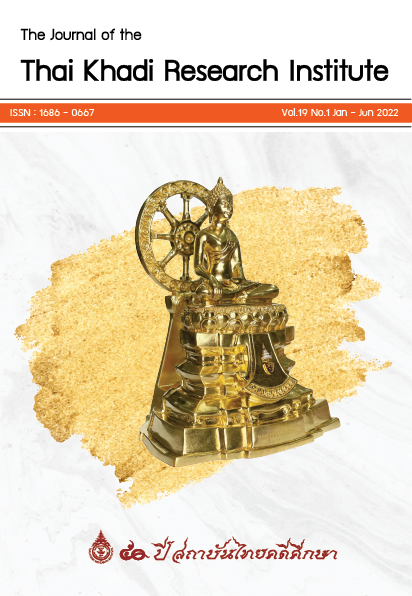บ้านคือวิมานของเรา: ความคิดเกี่ยวกับบ้านและครอบครัวของชนชั้นกลางไทย ทศวรรษ 2520
Main Article Content
บทคัดย่อ
ชนชั้นกลางเติบโตขึ้นมาพร้อมกับการขยายตัวของระบบเศรษฐกิจแบบ ทุนนิยม วัฒนธรรมการบริโภค และความเติบโตของสังคมเมืองภายหลังทศวรรษ 2500 พวกเขามีวิถีชีวิตแบบใหม่และสร้างสรรค์ระบบคุณค่าและอารมณ์ความรู้สึกเกี่ยวกับชีวิตครอบครัว (family life) แบบใหม่ขึ้นมา ด้วยการดำรงชีวิตท่ามกลางการแข่งขันในระบบทุนนิยมและบรรยากาศที่เลวร้ายลงเรื่อย ๆ ของสังคมเมือง ทำให้พวกเขาจินตนาการถึง “ครอบครัว” ในฐานะที่เป็น “พื้นที่ส่วนตัว” (private space) ที่เต็มไปด้วยความสุขและความสบาย นอกจากนั้น ครอบครัวแบบใหม่ยังเป็น “พื้นที่ทางอารมณ์ความรู้สึก” (space of feeling) ที่มีบทบาทหน้าที่และความรับผิดชอบทางด้านอารมณ์ความรู้สึก โดยเฉพาะในการวางรากฐานและเยียวยาทางอารมณ์ความรู้สึก ดังนั้น รูปแบบครอบครัวแบบเดิมที่มีบทบาททางด้านเศรษฐกิจเป็นหลักจึงค่อย ๆ ลดความสำคัญลง โดยเฉพาะในหมู่ชนชั้นกลางใหม่ที่อาศัยอยู่ในเขตเมือง
Downloads
Article Details

อนุญาตภายใต้เงื่อนไข Creative Commons Attribution-NonCommercial-NoDerivatives 4.0 International License.
ผู้เขียนจะต้องลงนามในแบบฟอร์มรับรองบทความ เพื่อให้คำยืนยันความรับผิดชอบว่า บทความของผู้เขียนนั้นไม่เคยตีพิมพ์ที่ใดมาก่อน พร้อมรับทราบว่า กระบวนการส่งบทความเข้าพิจารณาและตีพิมพ์ในวารสารไทยคดีศึกษานั้น จะไม่มีการเรียกเก็บค่าใช้จ่ายในการดำเนินการ ยกเว้น ในกรณีที่ผู้เขียนขอยกเลิกการตีพิมพ์บทความในวารสารไทยคดีศึกษาไม่ว่าด้วยสาเหตุใด และหลังจากบทความนั้นเข้าสู่กระบวนการพิจารณาของผู้ทรงคุณวุฒิไปแล้ว ผู้เขียนจะต้องรับผิดชอบต่อค่าใช้จ่ายที่เกิดขึ้นในกระบวนการประเมินเป็นจำนวนเงิน 3,000 บาท (สามพันบาทถ้วน)
เอกสารอ้างอิง
Davidoff, L. & Hall, C. (2002). Family Fortunes: Revised Edition. London and New York: Routledge.
Hamlin, D. (2007). Work and Play: The Production and Consumption of Toys in Germany, 1870 - 1914. U.S.A.: The University of Michigan Press.
Home and Garden, monthly magazine. (1976 - 1984). Bangkok: Amarin Press.
Home and Garden, Special Issue. (1980). Bangkok: Amarin Press.
Jeamteerasakul, S. (2013). Mass Monarchy. ย้ำยุครุกสมัย: เฉลิงฉลอง 40 ปี 14 ตุลา [Age Repeated, Marching to a new era: Four Decades of the 14 October 1973] (107 - 118). Bangkok: Foundation of Democratic Hero and Syndicate of the 14 October 1973 for an Absolute Democracy.
Love your children in the right way, Vol.2. (1990). Nakornpathom: Institute for Population and Social Research, Mahidol University.
Phetprasert, N. (2005). คนคอปกขาวในระบบเศรษฐกิจการเมืองไทย (พ.ศ. 2475 - 2535) [The white collars in Thai economic and politic (1932 - 1992)].
ฅนชั้นกลางไทยในกระแสทุนนิยม [Thai middle class in capitalism] (25 - 114). Bangkok: Political Economics Studies Center, Chulalongkorn University.
Praditsil, C. (1990). เศรษฐศาสตร์การเมืองว่าด้วยการวางแผนครอบครัวของไทย: ศึกษาจากกระบวนการนโยบาย [Political economy of family planning in Thailand: research on policy process]. (Master’s Thesis, Political Science, Thammasat University).
Prasartkul, P., Punpuing, S. & Vapattanawong, P. (2007). “ระเบิดคนเมือง” ในประเทศไทย [“Urbanite explosion” in Thailand]. In, ประชากรและสังคม 2550: นคราภิวัตน์และวิถีชีวิตเมือง [Population and Social Studies 2007: urbanization and city life] (4 - 17). Nakornpathom: Institute for Population and Social Research, Mahidol University.
Putthapanasub, P. (1996). กระบวนการในการกำหนดนโยบายวางแผนครอบครัวของประเทศไทย [Process of family planning policy setting in Thailand]. (Master’s Thesis, Economics, Chulalongkorn University).
Sakulleaw, N. (2009). ความเปลี่ยนแปลงทางเศรษฐกิจและสังคมกับการเมืองไทยสมัยสงครามโลกครั้งที่ 2 จนถึงการรัฐประหาร พ.ศ. 2500 [Socio - Economic change and Thai politics after the Second World War to the 1957 Coup]. (Master’s Thesis, History, Chiang Mai University).
Tangchonlatip, K. (2007). กรุงเทพมหานคร: เมืองโตเดี่ยวตลอดกาลของประเทศไทย [Bangkok: a perennial primate city of Thailand]. In ThongThai, V. & Punpuing, S. (ed.), ประชากรและสังคม 2550: นคราภิวัตน์และวิถีชีวิตเมือง [Population and Social Studies 2007: urbanization and city life] (18 - 35). Nakornpathom: Institute for Population and Social Research, Mahidol University.
Unchanam, P, (2018). กษัตริย์กระฎุมพี: มรดกทางประวัติศาสตร์จากรัชกาลที่ 9 แห่งราชวงศ์จักรี [Bourgeois king: the historical patrimony from King Rama 9 of Chakri Dynasty]. Samesky, 16(1), 7 - 71.
Wongyannava, T. (2018). ครอบครัวจินตกรรม: บทวิพากษ์ว่าด้วยชุมชน การปกครอง และรัฐ [The Imagined Family: Critique on community, domination, and state]. Bangkok: Illuminations Editions.


